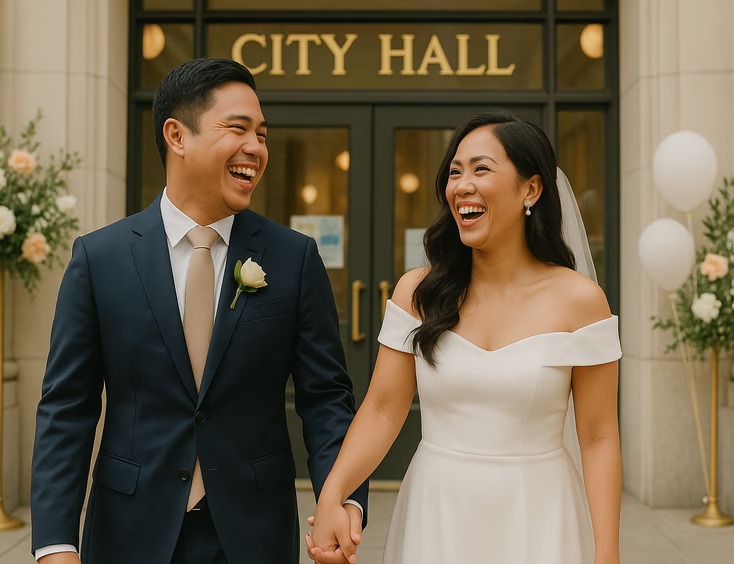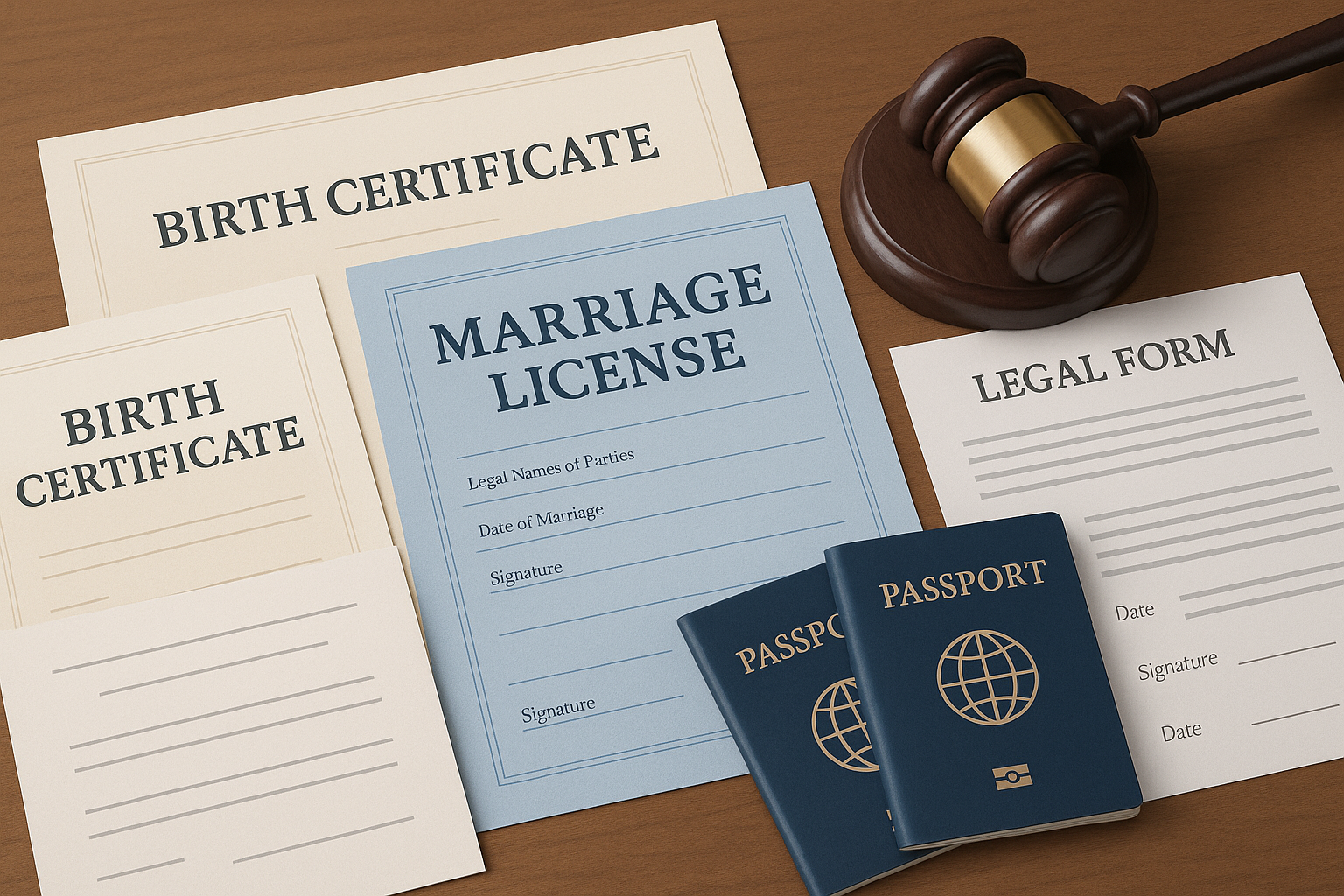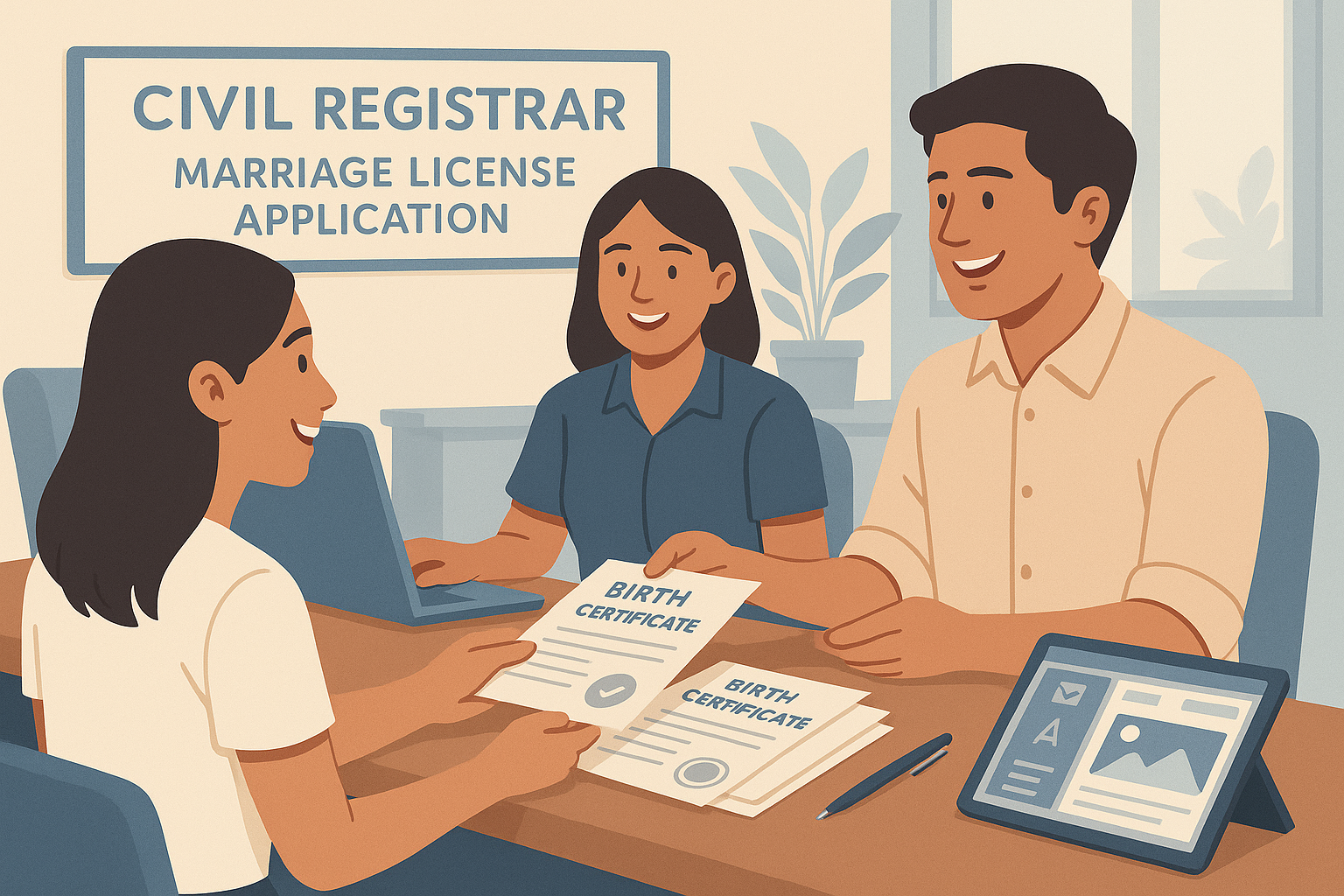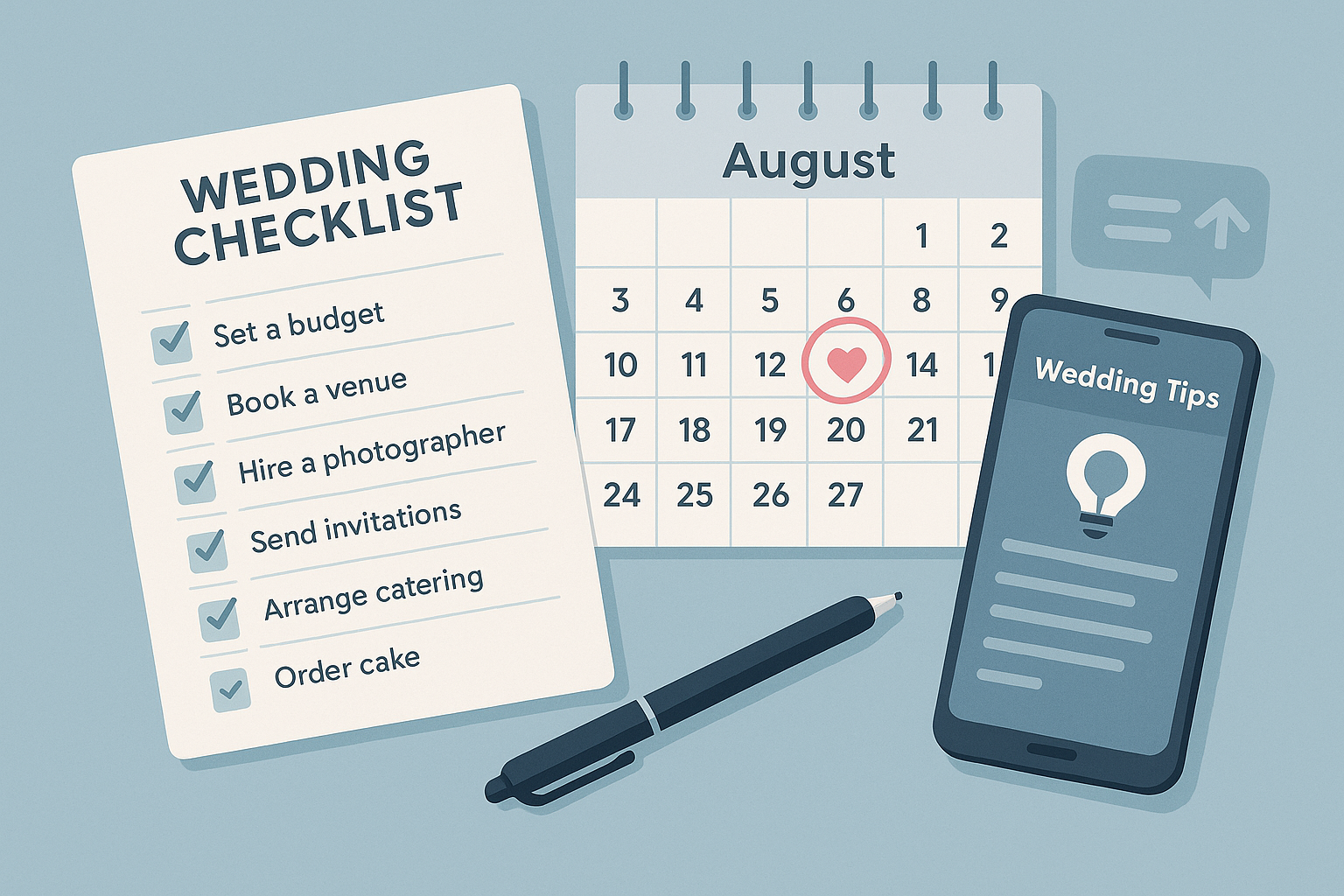
Complete List of Civil Wedding Requirements in the Philippines

A civil wedding is legally recognized in the Philippines and offers a straightforward, intimate option for couples who prefer a simpler ceremony than a church wedding. But before you can say "I do" at the courthouse, you'll need to prepare specific documents and meet certain requirements. Here's everything you need to know.
1. Standard Requirements for a Civil Marriage
These are the essential documents and steps required for all Filipino couples:
- Two Valid IDs (each)
You must present at least two government-issued IDs (e.g., passport, driver's license, UMID, postal ID). These validate your identity and information. - PSA Birth Certificate
Secure a certified birth certificate from the PSA. It confirms your full name, parents, and birth details, and verifies you meet the legal age requirement. Ordering online takes about 1–6 days (₱365); walk-in processing takes 3–13 days (₱140). - Certificate of No Marriage (CENOMAR)
Also from the PSA, this document proves that you haven't been married before or are not currently registered as married. Online issuance costs ₱420; walk-in is ₱195–₱210. - Marriage License Application Form
Obtainable from the Local Civil Registrar (LCR). You must complete four copies—one for the registry, one for you, one for the solemnizing officer, and one for the LCR archive. - Community Tax Certificate (Cedula)
Purchaseable from your barangay or city treasurer. The fee is ₱5, plus ₱1 for every ₱1,000 of your declared annual income. - Barangay Certificate
Issued by your local barangay to confirm residency. Costs around ₱20–₱50, and is processed the same day. - 1×1 ID Photo
Provide a recent color photo on a plain background for each spouse for registration purposes. - Pre-Marriage Counseling Certificate
Required if either applicant is aged 25 or younger. This half-day seminar covers responsible parenthood and family planning, typically held at the LCR.

2. Additional Requirements Based on Specific Circumstances
A. If You Are 18–21 Years Old
- Parental Consent is mandatory for both parties.
- Parents (or guardians) must personally appear with valid IDs, or submit a notarized Affidavit of Consent with two witnesses.
B. If You Are 22–24 Years Old
- Parental Advice is required—a written statement from parents indicating they've been informed.
- If parents disapprove, expect a 90-day waiting period; approval shortens this to 10 days.
C. If You Are Widowed
- Present the spouse's Death Certificate, issued by the PSA.
D. If You Are Annulled
- Provide your Certificate of Finality of Annulment from the court and a local civil registrar's Certificate of Registration.
E. If One Partner Is a Foreigner
Documents vary depending on nationality:
- U.S. Citizens: Obtain an Affidavit in Lieu of a Certificate of Legal Capacity to Marry from the U.S. Embassy or Consular Agency.
- Other Nationalities: Secure a Certificate of Legal Capacity to Marry or sworn declaration from your embassy, authenticated by the DFA.
- Passport bio-page photocopy and immigration arrival stamp.
- If previously married, include a Divorce Decree (for foreigners) or a court-recognized foreign divorce for Filipino spouses, plus a certified copy authenticated by the DFA.
- Death Certificate of former spouse (if widowed), embassy-issued and DFA-authenticated.

3. How to Apply for a Marriage License in the Philippines
Once you have gathered all the necessary documents, you are ready to start the application process for your marriage license. Here's a step-by-step guide:
Step 1: Go to the Local Civil Registrar (LCR)
- Visit the LCR office in the city or municipality where either you or your partner resides. Some LCR offices may require both parties to be present for submission, while others allow one partner to represent both.
- Check the office hours and any specific requirements of your local LCR ahead of time, as policies and processing times may vary.
Step 2: Submit All Required Documents
- Present all original and photocopied documents.
- The registrar will check your documents for completeness and accuracy. Any missing or incorrect information can delay your application.
Step 3: Fill Out the Marriage License Application Form
- Complete the application form provided by the LCR.
- Double-check your entries to avoid delays due to clerical errors.
Step 4: Attend the Required Seminars
- If you or your partner is 25 years old or younger, both of you must attend a pre-marriage counseling seminar.
- Some LGUs may require all couples, regardless of age, to attend seminars on family planning and responsible parenthood.
- After attending, you will receive a counseling certificate, which must be submitted to the LCR.
Step 5: Pay the Marriage License Fee
- Fees typically range from ₱100 to ₱350 depending on the LGU. This fee covers the processing and issuance of your marriage license.
- Always request an official receipt as proof of payment.
Step 6: Wait for the Posting Period
- The LCR will post your marriage application for 10 consecutive days at a public place within the municipal or city hall. This period allows anyone with a legal objection to come forward.
- If there are no objections after 10 days, your marriage license will be released.
Step 7: Claim Your Marriage License
- After the posting period, return to the LCR with your official receipt and valid IDs to claim your marriage license.
- The license is valid for 120 days anywhere in the Philippines and can only be used once.

4. Additional Tips and Frequently Asked Questions
How Long Does It Take to Process a Marriage License?
- The entire process—from document collection to license release—may take anywhere from 2 to 6 weeks. The bulk of this time is spent gathering documents and waiting for PSA certificates to arrive.
- Once your marriage license is issued, you have 120 days to get married. If you do not marry within this time, you will need to repeat the application process.
Where Can You Have a Civil Wedding?
- You may hold your civil wedding at your local city or municipal hall, a judge's office, a mayor's office, or, in some cases, at a barangay hall.
- Many judges and mayors are authorized to officiate civil marriages, but be sure to check their availability and any required booking processes.
Who Can Officiate a Civil Wedding?
Civil weddings in the Philippines can be officiated by:
- A municipal or city mayor
- A judge within their jurisdiction
- A priest, rabbi, imam, or minister of any church or religious sect (if recognized by the state)
How Much Does a Civil Wedding Cost?
The total cost depends on your location and preferences. On average, you might spend:
- ₱3,000 to ₱10,000 for the entire process, including paperwork, the ceremony, attire, and a small celebration.
- Some cities or municipalities may offer packages that include use of a venue, officiant's fee, and ceremonial arrangements.
Costs can rise if you opt for professional photography, catering, or a larger post-ceremony gathering.
How Many Guests Can Attend a Civil Wedding?
- Civil weddings are usually intimate, with 5–20 guests being typical. However, the guest limit is ultimately at the discretion of the officiant or the venue's capacity.
- If you wish to invite more people or have a unique venue, coordinate with your officiant and the LCR for special arrangements.
5. Final Reminders and Best Practices
- Double-Check Requirements: Local governments may have slightly different policies, so always consult your local LCR before beginning the process.
- Be Organized: Keep all your documents in a secure envelope or folder. Bring extra photocopies of everything.
- Plan Ahead: Some documents, such as the PSA birth certificate or CENOMAR, can take several days or weeks to obtain, especially if ordering online.
- Dress Appropriately: While civil weddings are less formal than church weddings, dressing neatly shows respect for the occasion.
- Arrive Early: On your wedding day, arrive at the venue early to avoid any last-minute issues.
Summary Table: Civil Wedding Requirements
| Requirement | Where to Get | Estimated Cost |
|---|---|---|
| Two Valid IDs (per person) | Issuing government | Varies |
| PSA Birth Certificate | PSA | ₱140–₱365 |
| PSA CENOMAR | PSA | ₱195–₱420 |
| Marriage License Application Form | LCR | Usually free |
| Cedula (Community Tax Cert.) | Barangay/City Hall | ₱5 + income |
| Barangay Certificate | Barangay | ₱20–₱50 |
| 1×1 ID Photos | Photo studio | ₱50–₱100 |
| Pre-Marriage Counseling Cert. | LCR | Usually free |
| Parental Consent/Advice (if needed) | Notary Public/LCR | ₱100–₱500 |
| Other (death cert, annulment, etc.) | PSA/Court/Embassy | Varies |
Final Thoughts
A civil wedding in the Philippines is an accessible and meaningful way to legalize your union. By diligently preparing your documents, consulting with your local civil registrar, and following these steps, you can ensure a smooth, worry-free process. Remember, whether your celebration is big or small, what matters most is your commitment to each other.
If you need clarification on any requirement or step, don't hesitate to ask your LCR or reach out to us for more expert advice.



